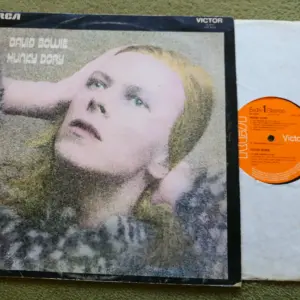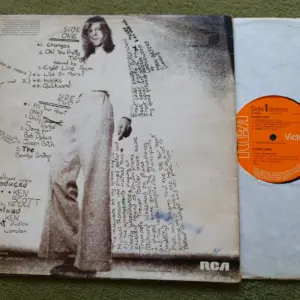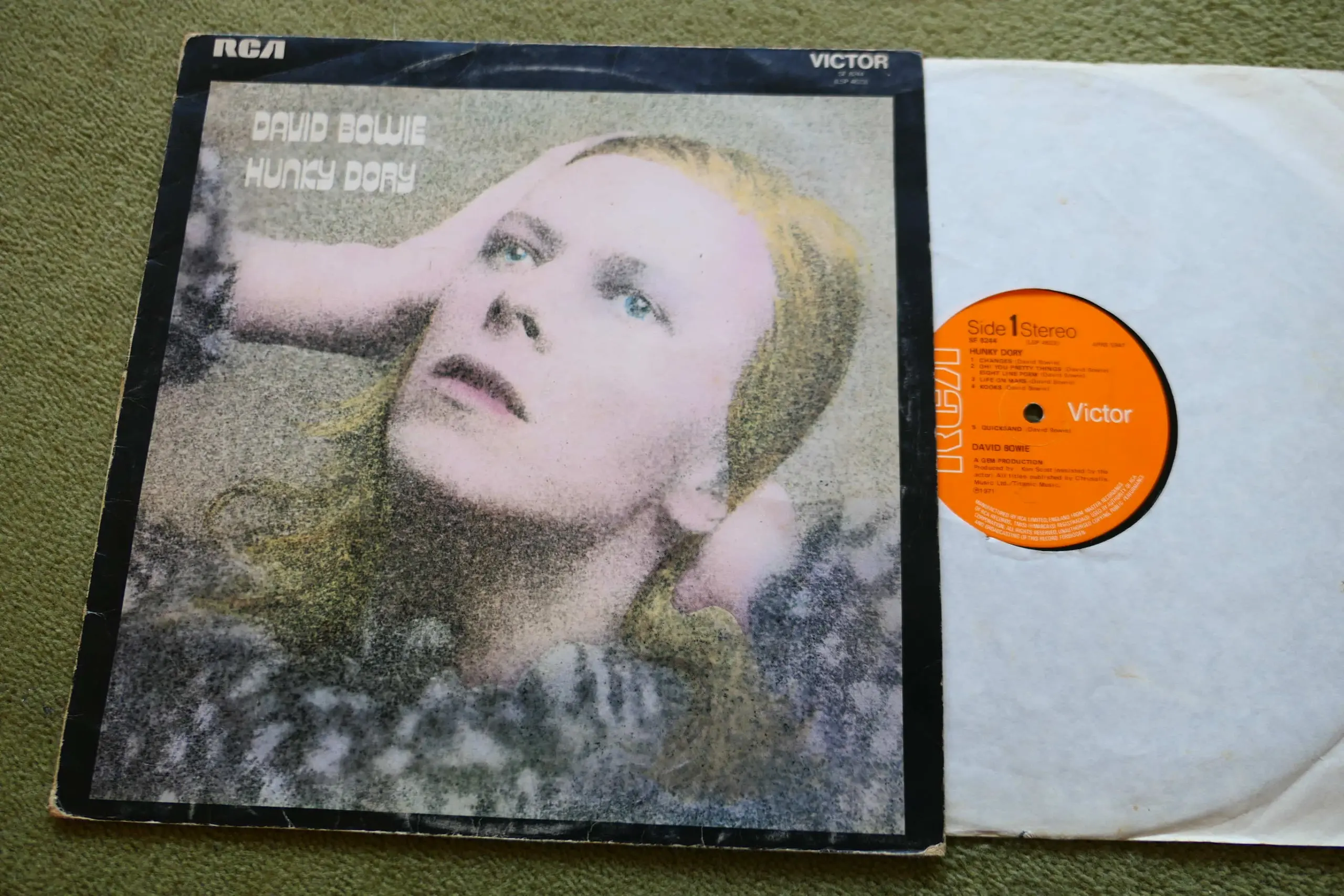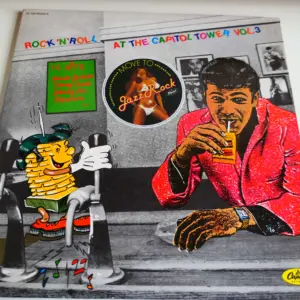David Bowie – Hunky Dory
(RCA Records 1972 SF8244)
Matrix No’s: APRS 5947 2E A2D / APRS 5948 3T A4J Rasputin – UK Pressing
No Mainman Logos
Sleeve in Very Good+ condition
– wear to edges/corners, some ringwear & back cover has some marks near bottom and “T.C” written bottom right corner
No Insert
Vinyl in Excellent/Very Good+ condition
(there are quite a few surface marks which do give light pops/crackles but sound quality is excellent overall)
David Robert Jones (8 January 1947 – 10 January 2016), known professionally as David Bowie, was an English singer, songwriter and actor. He was a figure in popular music for over five decades, becoming acclaimed by critics and other musicians for his innovative work. His career was marked by reinvention and visual presentation, his music and stagecraft significantly influencing popular music. During his lifetime, his record sales, estimated at 140 million albums worldwide, made him one of the world’s best-selling music artists. In the UK, he was awarded nine platinum album certifications, eleven gold and eight silver, releasing eleven number-one albums. In the US, he received five platinum and seven gold certifications. He was inducted into the Rock and Roll Hall of Fame in 1996.
Born in Brixton, South London, Bowie developed an interest in music as a child, eventually studying art, music and design before embarking on a professional career as a musician in 1963. “Space Oddity” became his first top-five entry on the UK Singles Chart after its release in July 1969. After a period of experimentation, he re-emerged in 1972 during the glam rock era with his flamboyant and androgynous alter ego Ziggy Stardust. The character was spearheaded by the success of his single “Starman” and album The Rise and Fall of Ziggy Stardust and the Spiders from Mars, which won him widespread popularity. In 1975, Bowie’s style shifted radically towards a sound he characterised as “plastic soul”, initially alienating many of his UK devotees but garnering him his first major US crossover success with the number-one single “Fame” and the album Young Americans. In 1976, Bowie starred in the cult film The Man Who Fell to Earth, directed by Nicolas Roeg, and released Station to Station. The following year, he further confounded musical expectations with the electronic-inflected album Low (1977), the first of three collaborations with Brian Eno that would come to be known as the “Berlin Trilogy”. “Heroes” (1977) and Lodger (1979) followed; each album reached the UK top five and received lasting critical praise.
After uneven commercial success in the late 1970s, Bowie had UK number ones with the 1980 single “Ashes to Ashes”, its parent album Scary Monsters and Super Creeps, and “Under Pressure”, a 1981 collaboration with Queen. He then reached his commercial peak in 1983 with Let’s Dance, with its title track topping both UK and US charts. Throughout the 1990s and 2000s, Bowie continued to experiment with musical styles, including industrial and jungle. He also continued acting; his roles included Major Celliers in Merry Christmas, Mr. Lawrence (1983), the Goblin King Jareth in Labyrinth (1986), Pontius Pilate in The Last Temptation of Christ (1988), and Nikola Tesla in The Prestige (2006), among other film and television appearances and cameos. He stopped concert touring after 2004 and his last live performance was at a charity event in 2006. In 2013, Bowie returned from a decade-long recording hiatus with the release of The Next Day. He remained musically active until he died of liver cancer two days after the release of his final album, Blackstar (2016).
Hunky Dory is the fourth album by English singer-songwriter David Bowie, released by RCA Records in 1971. It was Bowie’s first release through RCA, which would be his label for the next decade. Hunky Dory has been described by Allmusic’s Stephen Thomas Erlewine as having “a kaleidoscopic array of pop styles, tied together only by Bowie’s sense of vision: a sweeping, cinematic mélange of high and low art, ambiguous sexuality, kitsch, and class.”
The style of the album cover was influenced by a Marlene Dietrich photo book that Bowie took with him to the photo shoot.
Track listing
All songs written by David Bowie, except where noted.
- Side one
- “Changes” – 3:37
- “Oh! You Pretty Things” – 3:12
- “Eight Line Poem” – 2:55
- “Life on Mars?” – 3:53
- “Kooks” – 2:53
- “Quicksand” – 5:08
- Side two
- “Fill Your Heart” (Biff Rose, Paul Williams) – 3:07
- “Andy Warhol” – 3:56
- “Song for Bob Dylan” – 4:12
- “Queen Bitch” – 3:18
- “The Bewlay Brothers” – 5:22
Personnel
- David Bowie – vocals, guitar, alto and tenor saxophone, piano
- Mick Ronson – guitar, vocals, Mellotron, arrangements
- Rick Wakeman – piano
- Trevor Bolder – bass, trumpet
- Mick Woodmansey – drums
Technical personnel
- Ken Scott – producer, recording engineer, mixing engineer
- David Bowie – producer







Reviews
There are no reviews yet.